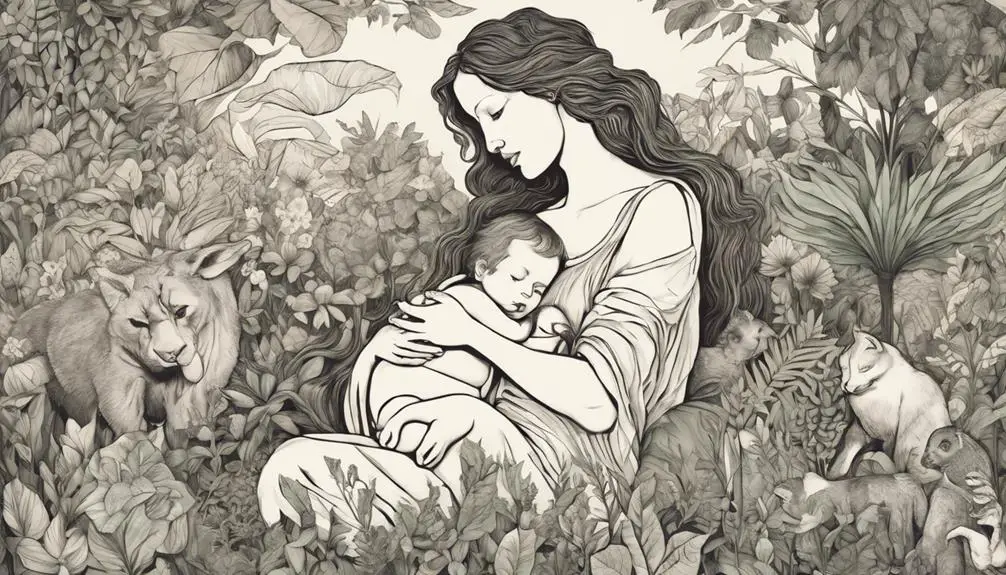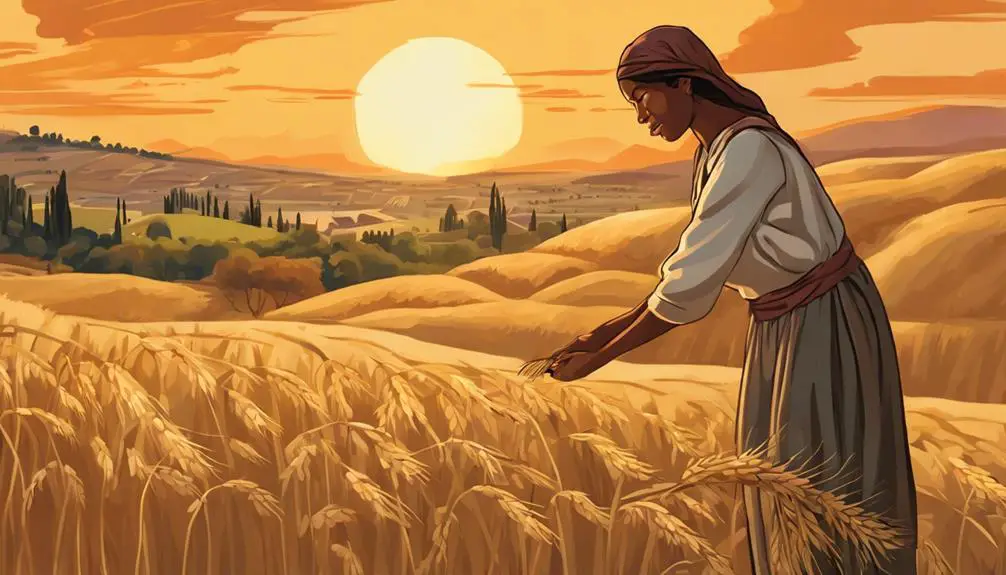Uncover the profound stories of nurturing women in the Bible, whose faith, love, and sacrifice continue to inspire and shape lives today.

Nurturing Woman in the Bible
As you embark on this exploration, imagine the Bible's landscape as a garden, where nurturing women bloom with stories that intertwine faith, love, and sacrifice. You'll meet Eve, whose journey from the dawn of motherhood sets the stage, Sarah, who lays the foundation of faith against barren odds, and Ruth, whose loyalty weaves a tapestry of love.
Esther and Mary add layers of courageous compassion and ultimate care. Each narrative invites you to uncover the depth of their influence and the strength of their character.
Let's peel back these layers together, uncovering insights that remain as relevant today as they were centuries ago.
Key Takeaways
- Mary exemplifies nurturing care and spiritual obedience, serving as a beacon of faith and devotion.
- Eve sets a foundational narrative for women's roles, symbolizing life's continuity and resilience.
- Ruth's story highlights the strength in love and loyalty, demonstrating resilience and commitment.
- Sarah's enduring legacy serves as a beacon of hope, illustrating struggles with barrenness and faith's fruition through the birth of Isaac.
Eve: Motherhood's Genesis

Eve, often revered as the inaugural mother, embodies the genesis of motherhood and sets a foundational narrative for women's roles in familial and societal constructs. Her story, deeply woven into the fabric of Judeo-Christian teachings, serves as a poignant reminder of the complexities inherent in the human condition. The narrative of original sin, precipitated by the infamous Garden temptation, casts a long shadow over interpretations of Eve's legacy. She navigates the delicate balance between curiosity and obedience, a balance that has shaped perceptions of virtue and vice.
This event, pivotal in religious texts, introduces the concept of transgression and its repercussions, not just for Eve but for all of humanity. It's through her actions that the themes of temptation, choice, and consequence become central to understanding human nature. Yet, it's also through Eve that the resilience and enduring strength of motherhood are first revealed. In the aftermath of the Garden temptation, Eve's journey doesn't end; it transforms. She becomes a symbol of life's continuity, navigating the challenges of a world outside paradise with grace and fortitude.
Eve's story, while marked by original sin, is also the first testament to the complexity and resilience of motherhood. Her narrative sets the stage for exploring the nuanced roles women occupy in both divine and earthly realms.
Sarah: Foundations of Faith

Building on the narrative of motherhood introduced by Eve, Sarah emerges as a pivotal figure in the tapestry of faith, embodying perseverance and the complexities of divine promise. Her story intertwines with Abraham's journey, reflecting a shared path of faith amidst trials. Sarah's barrenness becomes a central theme in understanding her character and the broader narrative of faith's triumph over despair.
- Sarah's struggle with barrenness reveals the depths of her faith as she confronts the seeming impossibility of God's promise.
- Abraham's journey, marked by divine calls and covenants, is intricately linked with Sarah's narrative, showcasing their partnership in faith.
- Divine intervention in Sarah's life emphasizes the power of faith and the fulfillment of seemingly impossible promises.
- The birth of Isaac symbolizes the fruition of faith and promise, a testament to perseverance in the face of doubt.
- Sarah's legacy endures as a foundation of faith, her story a beacon of hope and testament to the strength found in trusting God's promises.
Sarah's story, from barrenness to the birth of a nation, illustrates the remarkable journey of faith. Her enduring legacy teaches the value of patience, trust, and the belief in the fulfillment of divine promises.
Ruth: Loyalty and Love

Ruth's narrative stands as a profound testament to the power of loyalty and love, illustrating how these virtues can transcend familial and cultural boundaries. You'll find that Ruth's resilience isn't just a personal trait, but a beacon of hope and steadfastness in times of uncertainty and change. Her decision to leave her homeland and cleave to Naomi, her mother-in-law, showcases an unparalleled commitment not only to an individual but to an entirely new way of life.
Her story isn't just about loyalty; it's a masterclass in cultural adaptation. Ruth, a Moabite, immerses herself into the Israelite community with grace and purpose. You see her navigating the complexities of a new society, adopting its customs, and ultimately contributing to its lineage in a manner that honors both her heritage and her adopted culture. This blending of worlds doesn't dilute her identity; rather, it enriches the fabric of the community she joins.
Ruth's journey from a widow in Moab to the great-grandmother of King David is a narrative rich in lessons about the strength found in love and loyalty. It's a story that resonates profoundly, reminding you that true kinship isn't bound by blood, but forged through the fires of shared adversity and mutual respect.
Esther: Courageous Compassion

In the tapestry of biblical narratives, Esther's story emerges as a vivid depiction of courageous compassion, demonstrating how risk-taking for the greater good can shape the destiny of an entire people. Her journey, fraught with peril, showcases not just bravery but a profound understanding of royal wisdom and strategic patience. You observe these qualities in how she navigates the complexities of her position, ultimately leveraging it for the salvation of her people.
- Royal Wisdom: Esther's acumen in approaching the king, revealing her Jewish identity, and her plea for her people's safety.
- Strategic Patience: Waiting for the perfect moment to reveal Haman's plot against her people, showing impeccable timing.
- Courageous Compassion: Risking her own life by approaching the king unsummoned, driven by a deep care for her fellow Jews.
- Astute Planning: Organizing a banquet to win the king's favor and expose the villainy of Haman.
- Community Leadership: Encouraging Mordecai and her people to fast and pray, uniting them in a shared purpose.
Esther's story serves as a testament to the power of courageous compassion, royal wisdom, and strategic patience, offering a timeless example of how one person's resolve can bring about monumental change.
Mary: Ultimate Sacrifice and Care

Among the myriad of profound narratives within the Bible, Mary's story exemplifies the pinnacle of sacrifice and nurturing care, illuminating her role as a cornerstone of faith and devotion. Her journey embodies divine motherhood, marked by unparalleled spiritual obedience. Mary's acceptance of her role, despite the immense personal costs, showcases her profound strength and unwavering faith.
You'll see that her divine motherhood wasn't merely a title but a testament to her character. She navigated the complexities of her calling with grace, embodying the epitome of maternal care and sacrifice. Her willingness to embrace this path, knowing the challenges it entailed, underscores her exceptional dedication.
Furthermore, Mary's spiritual obedience isn't just a mere act of submission but a profound declaration of trust in the divine plan. Her life serves as a beacon of faith, guiding you to understand the depth of her devotion. This spiritual obedience wasn't passive; it was an active engagement with her faith, demonstrating her pivotal role in the narrative of salvation.
Mary's story, thus, isn't just one of sacrifice and care; it's a narrative that weaves together the threads of divine motherhood and spiritual obedience, offering a nuanced understanding of her integral role in the tapestry of faith.
Frequently Asked Questions
How Do the Nurturing Roles of Women in the Bible Reflect on Their Leadership Qualities and Decision-Making Abilities in Crisis Situations?
When you examine leadership styles and crisis management, it's evident that nurturing roles significantly enhance decision-making abilities during crises. This approach brings a unique blend of empathy and resilience, often overlooked in traditional leadership models.
You'll find that nurturing not only strengthens relationships but also fosters a sense of community and unity, essential for effective leadership. Such qualities are invaluable, especially when navigating through challenging situations, demonstrating a profound impact on leadership efficacy.
In What Ways Do the Stories of These Biblical Women Influence Modern Perspectives on Gender Roles and Female Empowerment Within Religious Communities?
You're exploring how biblical stories shape today's views on gender roles and female empowerment in religious settings. By examining these narratives, you're challenging gender stereotypes and contributing to modern feminism.
These tales offer insights into overcoming traditional constraints, inspiring a reevaluation of women's capabilities and roles. Your analysis reveals the impact of these ancient examples on current discussions about equality and leadership within faith communities, promoting a more inclusive understanding.
How Does the Concept of Nurturing, as Exemplified by These Women, Extend Beyond Motherhood to Include Mentorship and Spiritual Guidance?
You'll find that nurturing extends well beyond motherhood, embracing mentorship and spiritual guidance. Through gardening metaphors, this concept blooms, illustrating how one cultivates growth in others.
It's not just about tending to immediate needs; it's about planting seeds for future development. Cultural shifts have broadened our understanding of nurturing roles, showcasing how they foster resilience and wisdom across communities.
This approach enriches the tapestry of support, evidencing a profound, enduring influence.
What Are the Challenges and Criticisms Faced by These Biblical Women in Their Times, and How Do They Mirror the Challenges Faced by Women in Leadership Roles Today?
You're delving into the hurdles and critique faced by women in leadership, both historically and in contemporary settings. Their challenges often reflect societal norms, akin to fashion trends, and the necessity to navigate political strategies.
This analysis mirrors the experiences of biblical women, showing how their struggles against societal constraints and criticism aren't isolated incidents but part of a broader narrative of women's leadership roles over time.
How Do the Narratives of These Women Contribute to the Broader Theological Understanding of Compassion, Sacrifice, and Love in the Context of Both Personal Faith and Community Welfare?
You're exploring how narratives highlight compassion, sacrifice, and love, reflecting on personal faith and community welfare.
These tales, enriched by divine intervention and symbolic interpretations, deepen theological understanding.
Analyzing these stories, you'll find they're not just historical accounts but lessons on the virtues vital for leadership and empathy.
They teach that true strength lies in nurturing others, showcasing how ancient wisdom still guides modern perspectives on leadership and communal harmony.
Conclusion
In analyzing these remarkable women of the Bible, it's evident that their nurturing spirits have laid a profound foundation for understanding care and compassion. From Eve's pioneering motherhood to Mary's ultimate sacrifice, each story encapsulates a unique essence of love, faith, and courage.
They not only embody the virtues of nurturing but also illustrate how these acts of love transcend time, teaching us invaluable lessons about the depth and strength of womanhood in nurturing roles.



Sign up